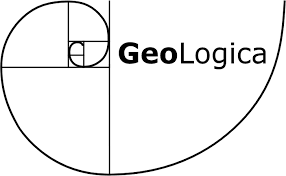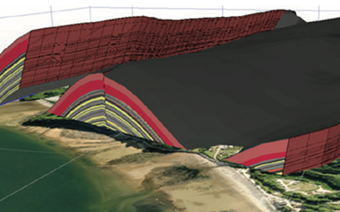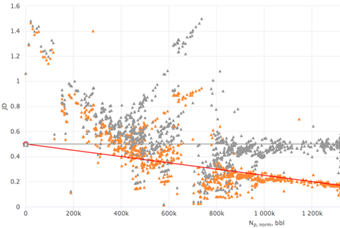
2023 Training Course Dates
Booking is now open on the initial release of GeoLogica’s 2023 scheduled training courses. Their rolling programme of GeoEnergy Transition and Subsurface courses will continue to be updated as the weeks and months progress but, in the meantime, make the most of the Early Bird prices.
GeoLogica will be honouring their 2022 prices until 31 January 2023.
In addition to their scheduled programme, GeoLogica can run exclusive, customised, online, classroom and field training courses for your team, delivering learning objectives that are relevant to your specific business requirements.
Geonuclear: Technology and Deep Geological Disposal

Date: 20 - 21 Feb 2023
Location: Online
Tutors: Jonathan Turner, Chief Geologist, Radioactive Waste Management, and Brian Matthews, Independent Consultant, Founder and Managing Director of TerraUrsa
OverviewThis course covers aspects of nuclear technology, power production and deep geological disposal of nuclear waste, including global history, policy, mining to disposal, safety, opportunities for geoscientists in this industry and how nuclear power can help achieve Net Zero.
You will learn to:
- Understand the scientific and technological background of nuclear power.
Describe how a nuclear power plant/power station works.
Characterise the effects and risk of radiation.
Evaluate how the history of the nuclear industry has shaped policy and public engagement today.
Interpret a typical nuclear fuel cycle (mining to disposal).
Develop an understanding of the economics and policy surrounding nuclear power and its growth internationally.
Assess the social impact of nuclear power and its benefits to climate change and achieving Net Zero.
Understand the future options for nuclear technologies and how they can work alongside other technologies.
Appreciate the history of the global nuclear waste siting process.
Describe a Geological Disposal Facility (GDF).
Characterise the multi-barrier system.
Appreciate how site characterisation is undertaken and the central role of site descriptive models.
Evaluate major programme management for waste disposal, including planning and permitting process (Nationally Significant Infrastructure Projects).
Appreciate the regulatory environment and safety cases around waste disposal, particularly the post-closure safety case.
Introduction to Low-Enthalpy Geothermal Exploration

Date: 13 - 17 Mar 2023
Location: Online
Tutor: Mark Ireland: Lecturer in Energy Geoscience, Newcastle University
Overview
This course covers all aspects of low enthalpy geothermal exploration and production. It is intended as an introduction to the entire lifecycle of low enthalpy geothermal resources, covering aspects of geoscience and engineering.
You will learn to:
- Understand the applications and use of low enthalpy geothermal energy
- Recall the basic principles of heat generation within the upper crust
- Describe the key characteristics of geothermal resources and reservoirs
- Understand the production options for low enthalpy geothermal resources
- Appreciate project risks and uncertainties in developing geothermal resources
Reservoir Engineering Fundamentals: The Essentials in a Day

Date: 21 - 22 Mar 2023
Location: Online
Tutor: Mark Cook: TRACS International, Ltd
Overview
Have you been on reservoir engineering classes in the past, heard the terms, seen the equations but not used any of it directly yourself? Would you like someone to run over the basics and just pick out the essentials – the parts everyone really needs to know? This short, focused class is designed to explain how reservoir engineers make subsurface interpretations, use these to build models to make forecasts and use these in turn to influence significant investment decisions.
The course will cover what types of models the reservoir engineer uses, from simple analytical (graphical and spreadsheet) tools to more complex numerical simulators, and will put in context the key fundamentals of rock and fluid properties, reservoir deliverability, well performance and process design. It will illustrate how these fundamentals and the commercial E&P context place constraints on forecasts, and why a significant associated range of uncertainty results. This will be done in plain language accessible to those working outside reservoir engineering with the aim of giving you what you need to know to understand the subject – just the essential details.
You will learn to:
- Understand the principles of fluid flow in porous media (reservoirs).
- Recognize how fluid properties influence reservoir, well and processing performance.
- Distinguish the benefits and limitations of well testing.
- Understand how engineers decide on reservoir development methods, predict recovery factors and production profiles for oil and gas reservoirs.
- Appreciate that not all reservoir models need to be complex and understand when simple models suffice and when complex numerical simulation models are justifiable.
- Recognize tools used for reservoir monitoring and standards for reporting reserves.
Carbon Capture and Storage: The Geoscience Fundamentals

Date: 17 - 18 Apr 2023
Location: Online
Tutor: Richard Worden: Professor, University of Liverpool, Director of Geochem Research Ltd
Overview
This course will provide participants with the fundamental geoscience concepts of Carbon Capture and Storage (CCS) projects; namely subsurface CO2 storage volumetrics, CO2 flow in the subsurface away from injector wells, the goal of safe and permanent storage of CO2 and cost-benefit issues linked to aquifer depth, well design, etc. The course is aimed at non-specialist staff so basic geoscience concepts will be explained throughout. The need for CCS will be laid out with evidence as to why geoscientists know it can be effective at mitigating greenhouse gas emissions. The course will deal with CO2 as a fluid phase and how much can be stored in the subsurface. It will deal with how quickly CO2 can be injected and the factors that influence injection rate. The range of consequences of injecting large volumes of CO2 into the subsurface will also be covered, including the risk of minor Earth tremors. The range of possible CO2 leakage mechanisms will be presented, and the course will conclude with a consideration of monitoring strategies and risk assessment approaches.
You will learn to:
- Appreciate why CCS is needed to cut global carbon emissions.
- Develop an understanding of the role of geoscience in CCS and the role of CCS in CO2 emissions reductions.
- Appreciate what CO2 injection projects have occurred so far and how they differ from industrial CCS planned in the UK.
- Understand how and why CCS works, including basic geological concepts about rocks, fluids in those rocks and the key physical properties of rocks involved in CCS projects.
- Understand CO2 as a fluid in the subsurface and how it differs from water, oil, and natural gas.
- Build an appreciation of how much CO2 can be stored in both old (depleted) oil and gas fields and saline aquifers, and understand the benefits of depleted hydrocarbon fields versus saline aquifers.
- Develop a basic understanding of the flow properties of porous rocks and the rate at which CO2 can be injected through a well during CCS, including an appreciation of the role of heterogeneity on the success of CCS projects.
- Understand the range of detrimental and beneficial effects that CO2 can have on the host aquifer, from geomechanical to geochemical.
- Grasp the critical importance of the role of top-seal and fault-seal properties and how they influence CO2 storage, from risk of fracking, or induced seismicity, to mineral dissolution.
- Understand the range of ways that CO2 could escape from planned CCS sites.
- Develop an awareness of the range of monitoring strategies that could be employed to ensure safe and long-term storage of CO2.
Uncertainty and Risk in Development: Quantifying Subsurface Risk and Uncertainty for Producing Assets

Date: 18 - 19 Apr 2023
Location: Online
Tutor: Mark Bentley, Mark Cook or Richard Oxlade: TRACS International, Ltd
Overview
The quantification of risk and uncertainty is often discussed in the context of exploration and appraisal, yet most of the upstream E&P business concerns decision-making in producing assets. Handling uncertainty in development and production must deal with a growing and often imperfect production database against a backdrop of constantly changing circumstances. As the life cycle progresses, initial uncertainties over volume and productivity narrow but are supplanted by new uncertainties such as sweep efficiency, fine scale architecture and changing responses to new production mechanisms and techniques. These new issues demand a change in approach for the quantification of uncertainty, and vigilance is required to avoid the subsurface interpretation simply collapsing on to a best guess.
This short, focused workshop explores the key aspects required to manage subsurface uncertainties and associated risks during the producing field life, in terms of people, tools and approach. It will close with a set of questions to ask yourself and others, suitable for reference in informal personal or team reviews, peer reviews and peer assists.
You will learn to:
- Resolve misunderstandings over definitions in risk and uncertainty.
- Understand the key differences between uncertainty and risk in development, compared to exploration and appraisal.
- Explain and mitigate common errors in handling probability.
- Describe workflows for handling risk and uncertainty in development decisions.
- Account for the impact of cognitive bias in E&P, and what to do about it.
Geothermal Technologies and Well Design

Date: 24 - 27 Apr 2023
Location: Online
Tutor: Gioia Falcone: Rankine Chair of Energy and Engineering, University of Glasgow
Overview
This course covers fundamental aspects of geothermal engineering, linking the subsurface to the point of sale (or point of use). It encompasses the main geothermal energy uses, focusing on deep geothermal resources exploitation methods, where wells are required. The course also covers conventional and unconventional geothermal technologies, including closed-loop solutions and hybrid energy development opportunities.
You will learn to:
- Understand the different way in which a given geothermal energy resource can be exploited, and the associated uses.
- Describe how open-loop and closed-loop engineering solutions work.
- Interpret operational aspects of typical geothermal well designs.
- Identify the uncertainties and risks of different exploitation methods, vis-à-vis resource sustainability over project lifetime.
- Assess the impact of different well performance and well integrity aspects on ultimate recovery.
- Discuss and analyse case studies involving different geothermal technologies.
Systems to Classify, Categorize and Report Geological CO2 Storage Capacity

Date: 02 - 04 May 2023
Location: Online
Tutor: Bob Harrison, Sustainable Ideas Ltd
Overview
While large scale carbon capture and storage (CCS) implementation continues to be debated, when it happens, a subsurface carbon storage management system will be needed. Such a framework must be capable of describing objective estimates of CO2 storage with respect to quantity and quality of available data, give a range of uncertainty in the estimation and provide injection project status from cradle to grave. The course reviews the subsurface carbon storage frameworks that are currently on offer worldwide.
You will learn to:
- Appreciate the requirement for an auditable carbon storage reporting system.
- Gain familiarity with the different systems to report geologic carbon sequestration.
- Understand the pros and cons and limitations of the reporting systems on offer.
- Appreciate the key uncertainties in storage capacity estimates and how they may alter over time with increasing knowledge and experience.
- Be aware of bias in reporting and how to mitigate against it.
- Understand the need for appropriate ‘project boundaries’ to allow project comparison.
An Introduction to Sequence Stratigraphy

Date: 09 - 11 May 2023
Location: Online
Tutor: Gary Hampson: Imperial College London
Overview
Sequence stratigraphy is a key tool for subsurface interpretation of depositional systems and thereby predicting the distribution of reservoir, source rock and seal lithologies. The course will introduce the principles and methods of sequence stratigraphy, with a focus on continental, shallow-marine and deep-marine depositional settings. Participants will apply these principles and methods via the sequence stratigraphic interpretation of subsurface data (e.g. seismic, well-log, core, reservoir production data).
You will learn to:
- Understand the basic terminology of sequence stratigraphy.
- Describe the key surfaces and systems tracts.
- Appreciate the main components of depositional sequences in continental, shallow-marine and deep-marine systems.
- Evaluate a range of subsurface data in terms of sequence stratigraphic methods and models.
KeyFacts Energy Industry Directory: GeoLogica l KeyFacts Energy news: Training
 KEYFACT Energy
KEYFACT Energy